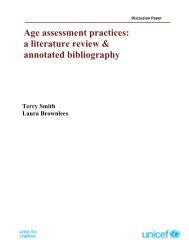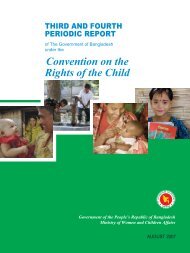Government-funded programmes and services for vulnerable - Unicef
Government-funded programmes and services for vulnerable - Unicef
Government-funded programmes and services for vulnerable - Unicef
You also want an ePaper? Increase the reach of your titles
YUMPU automatically turns print PDFs into web optimized ePapers that Google loves.
<strong>Government</strong>-<strong>funded</strong> <strong>programmes</strong> <strong>and</strong> <strong>services</strong> <strong>for</strong> <strong>vulnerable</strong> children in SA<br />
The only source of funds <strong>for</strong> many schools, especially those with a significant number of<br />
poor learners, is the school fee revenue, which leaves them little option but to pursue this<br />
revenue aggressively (Giese, Hombakazi et al. 2009).<br />
The DoE has recognised this problem <strong>and</strong> identified the development of appropriate<br />
policies <strong>and</strong> plans to address funding of the school fee exemption in its 2009–2013<br />
Strategic Plan.<br />
The most <strong>vulnerable</strong> children whom the current school fee exemption policy seeks to<br />
protect are not spared the impact of the policy failings. Despite the fact that the law<br />
expressly provides <strong>for</strong> an automatic exemption from paying school fees <strong>for</strong> the caregivers<br />
of children receiving the CSG <strong>and</strong> the FCG, this is not happening in practice. Schools are<br />
charging these parents school fees <strong>and</strong> not advising them of their rights in this regard.<br />
The majority of children receiving the CSG are not getting an automatic full school fee<br />
exemption. Instead, they are paying their school fees with their CSG income, resulting in<br />
one department cross-subsidising another department’s legal obligations, at the expense of<br />
the children requiring support (CASE 2008). 86<br />
The extent of the government’s funding per learner at fee-paying schools is less than the<br />
‘adequacy’ benchmark <strong>for</strong> providing a quality education. In the context of operating in<br />
poor communities, many of these schools are unable to make up the difference through<br />
fundraising or fees (most notably the poorer schools). As such, the ability of these schools<br />
to deliver a quality education <strong>and</strong> provide an environment conducive to learning is<br />
compromised (Hall & Giese 2009).<br />
School uni<strong>for</strong>m assistance policy<br />
The assistance provided at a policy level to poor learners to make uni<strong>for</strong>ms more<br />
af<strong>for</strong>dable does not provide material relief. There is no obligation in terms of the current<br />
guidelines to actually provide uni<strong>for</strong>ms <strong>for</strong> free or to subsidise the cost of uni<strong>for</strong>ms <strong>for</strong><br />
poor learners. The guidelines go no further than obliging the school governing body<br />
to take measures, within its available resources, to make uni<strong>for</strong>ms more af<strong>for</strong>dable.<br />
Schools with significant numbers of poor learners will in all likelihood not have access to<br />
resources to make uni<strong>for</strong>ms more af<strong>for</strong>dable, other than perhaps establishing a secondh<strong>and</strong><br />
school uni<strong>for</strong>m shop (Roussel 2007).<br />
The burden of implementation of the guidelines rests with the school governing bodies.<br />
The guidelines have little or no legal <strong>for</strong>ce <strong>and</strong> there<strong>for</strong>e it is not possible to compel<br />
action by these bodies, which means that the implementation of the guidelines depends<br />
on their voluntary compliance. Evidence in the report by Roussel (2007) shows a tendency<br />
by school governing bodies not to act proactively in the implementation of the guidelines.<br />
The guidelines are at times contradictory. For example, in an ef<strong>for</strong>t to prevent the lack<br />
of a school uni<strong>for</strong>m becoming a barrier <strong>and</strong> excluding learners, the guidelines prohibit<br />
the exclusion of a learner from school on the basis that they do not have a uni<strong>for</strong>m. At<br />
the same time, the guidelines allow not wearing the appropriate uni<strong>for</strong>m to constitute a<br />
disciplinary offence.<br />
86 In a study of 2 700 primary caregivers of children aged 0–13 in low-income areas in the CASE study, it was found<br />
that two-thirds of the CSG recipients were paying school fees. This was confirmed in a study conducted by<br />
Giese, Hombakazi et al. (2009).<br />
174
















